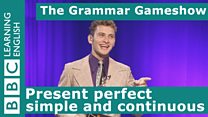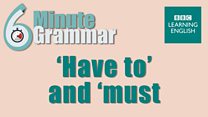Unit 1: The Grammar Gameshow
Test your grammar knowledge
Select a unit
Session 6
Welcome to the Grammar Gameshow! Test your knowledge in this crazy quiz! The presenter is a bit strange, the points don't make sense and the prizes could use some improvement, but at least the grammar is correct!
Session 6 score
0 / 3
- 0 / 3Activity 1
Activity 1
Episode 5: Have to and Must
In this episode our two contestants find themselves testing all the rules with their knowledge of 'have to' and 'must'! These two little grammar points are all about obligations! Are they the same? Can you tell the difference? Will Mya win through again? Find out in this episode of the Grammar Gameshow.
Watch the video and then test yourself below with our quiz

Will
Hello, and welcome to today’s Grammar Gameshow! I’m your host, Will, but I’m no has been! And of course, let’s not forget Leslie, our all-knowing voice in the sky.
Leslie
Hello, everyone!
Will
Tonight we’re going to ask you three questions about…
Leslie
Have to and must. Those two little expressions that are to do with obligation and make all the rules!
Will
OK! Now, let’s meet our contestants!
Simone
Hi, everyone. I’m Simone!
Will
And contestant number two?
Mya
Hello, everyone. I’m Mya!
Will
Welcome back, Mya! OK! Let’s get going. And don’t forget you can play along at home too. Our first question is multiple choice. Which of these uses of ‘have to’ and ‘must’ is different from the others?
a) You must wear your seatbelt.
b) You have to wear your seatbelt.
c) You mustn’t wear your seatbelt.
d) You don’t have to wear your seatbelt.
Simone
D is different because it describes a voluntary action
Will
Leslie?
Leslie
You’re not wrong there, Simone. ‘Must’, ‘mustn’t’ and ‘have to’ all talk about obligations - for example, rules that you need to follow. But ‘don’t have to’ is the opposite – the actions it describes are voluntary. Such as, Will doesn’t have to give anyone any points! He’s the boss!
Will
True! But, since I’m nice! Simone, you can have two points. And Mya, I liked your ‘thinking face’ there, two points to you!
Simone
Hang on! That’s not fair. Why does…
Will
Fingers on the buzzers. Here comes question two! True or false: There is no difference between ‘have to’ and ‘must’ for obligations.
Simone
False!
Will
Leslie?
Leslie
It is false! Although many use them interchangeably, in fact, we use ‘have to’ for external obligations, and ‘must’ for internal obligations.
Will
OK. One point for that. Now for the quick fire part. Based on what Leslie has just told us, tell me if these obligations would take ‘have to’ or ‘must’. You decide not to smoke.
Mya
I mustn’t smoke.
Leslie
Correct!
Will
The government wants you to pay your taxes.
Simone
We have to pay taxes.
Leslie
Correct!
Will
You don’t want to exercise, but the doctor tells you to.
Mya
I have to exercise.
Leslie
Correct!
Will
You want to brush your teeth more.
Simone
I must brush my teeth more.
Leslie
Correct!
Will
You try to resist eating chocolate.
Mya
I mustn’t eat chocolate.
Leslie
Correct!
Will
Your parents tell you to do homework.
Simone
I have to do homework.
Leslie
Correct!
Will
Well done both of you. Have 13 points between you. It’s time for our final question: ‘Must’ and ‘have to’ are modal verbs. But why is ‘have to’ different from other modal verbs?
Simone
Trick question! All modal verbs are followed by a bare infinitive verb so there is no difference.
Will
Leslie?
Leslie
It’s true that all modals, including ‘must’ and ‘have to’, are followed by a bare infinitive. But that’s not our answer.
Will
Ouch, Simone. You crashed and burned there. Mya, I can offer it to you.
Mya
Is it because modal verbs don’t change their form, but ‘have to’ does?
Will
Leslie?
Leslie
Absolutely right! Unlike other modal verbs, ‘have to’ changes to show person – for example, ‘have to’. ‘has to’ - and time – for example, ‘had to’, ‘didn’t have to’. Its meaning doesn’t change though.
Will
Good job Mya. You know, I’m taking 20 points away from Simone for stupidity, and giving them to you.
Simone
No!
Will
Well that brings us to the end of today’s Grammar gameshow. Let’s count out the points. And the winner is… Mya with 37 and a half. Well done! Here’s what you’ve won!
Leslie
It’s a cuddly toy!
Will
You’ve finally got a friend! We’ll see you again next week, where you can play for an even bigger prize. And, Simone, what happened? You were doing so well!
Simone
Well, to be honest I…
Will
Unleash the sheep. It looks like we’ll need another contestant. Thanks for joining us. Say goodbye, Leslie.
Leslie
Goodbye, Leslie.
Will
See you next time!
______________________________________________________________________________________
Did you like that? Why not try these?
________________________________________________________________________________________________
Modal verbs: have to and must
Modals
All modal verbs are followed by a bare infinitive. With the exception of ‘have to’ modal verbs do not change form to show person or time.
I have to go to work today.
I must go to work today.
You mustn’t go to work today.
Must she go to work today?
Obligation
‘Have to’ and ‘must’ are concerned with obligation. ‘Must’, ‘mustn’t’ and ‘have to’ tell us what we are obliged to do or what is forbidden. However, ‘don’t have to’, ‘doesn’t have to’ and ‘didn’t have to’ all describe a voluntary action – you can choose.
I don’t want to, but I have to go to my brother’s wedding.
You must stop smoking if you ever want to recover.
Children mustn’t go into the kitchen without an adult
We don’t have to eat at college. We can eat in town if you like.
Internal or External obligations?
Many people use ‘have to’ and ‘must’ interchangeably. But, they are a little different. ‘Must’ describes internal obligations – these are the rules which the speaker gives themselves. ‘Have to’ describes external obligations – these are rules from an outside authority to the speaker (e.g. the government, or parents.)
If I want to lose weight, I must start doing more exercise.
The doctor told me to lose weight so I have to go to the gym.
Have to
‘Have to’ is the only modal verb which changes its form for person and time. It can be used in the past tense too.
I / You / We / They have to drive on the left in the UK.
He /She / It has to drive on the left in the UK.
When I was a boy, I had to get up every day and work with my father.
When she was younger, she didn’t have to go to school.
To do
Try our quiz to see how well you've learned today's language.
The Grammar Gameshow Quiz
3 Questions
Test your grammar knowledge with the Grammar Gameshow quiz!
Help
Activity
Test your grammar knowledge with the Grammar Gameshow quiz!
Hint
Have to is for external obligations and must is for internal obligations.Question 1 of 3
Help
Activity
Test your grammar knowledge with the Grammar Gameshow quiz!
Hint
There are four modal verbs here: 'have to', 'don't have to', 'must' and 'mustn't'. Three of them are used for something that is obligatory. One of them expresses a voluntary choice. But which is which?Question 2 of 3
Help
Activity
Test your grammar knowledge with the Grammar Gameshow quiz!
Hint
All modal verbs are followed by a bare infinitive. ‘Have to’ is the only modal very which changes its form for person and time. One of these sentences contains a mistake, look carefully!Question 3 of 3
Excellent! Great job! Bad luck! You scored:
More
That's all from Leslie and the contestants for this episode. Why not go to The Grammar Gameshow homepage to watch another one?
Downloads
You can download the audio and PDF document for this episode here.


